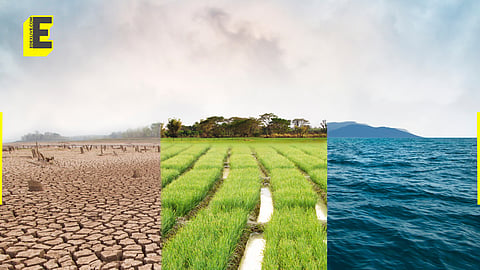‘Blueprints to Breakthroughs’: Preparing engineers for net-zero challenges on Engineer's Day
Climate justice is not merely an option, it is a moral imperative. India, with carbon dioxide emissions now approaching 2 tons per capita, has pledged to reach net-zero emissions by 2070 in a staged manner. By 2030, India has committed to expanding its non-fossil energy capacity to 500 GW, sourcing 50 percent of its energy from renewables, and reducing projected emissions by one billion tonnes.
These short-term targets are fast approaching, and achieving them will demand strong action in policy, technology, and research-anchored in carbon neutrality, and the circular economy.
A closer look at the data reveals where the challenge lies. Electricity and heat production account for more than half of the country’s greenhouse gas emissions, while manufacturing and construction add about 25 percent, and transportation accounts for roughly 12 percent.
The numbers are stark: producing just one tonne of crude steel generates two and a half tonnes of carbon dioxide. Yet there is a silver lining, engineering solutions, backed by research, already exist.
Carbon capture and utilisation technologies offer ways to trap emissions before they enter the atmosphere.
Electric mobility has the potential to transform the transportation sector, drastically cutting fuel-related emissions. And perhaps most promising is green hydrogen, produced through water splitting using renewable electricity, which creates a truly zero-emission fuel. This could decarbonise hard-to-abate industries such as heavy transport, steel, and chemicals.
The challenge, however, lies in developing efficient and scalable hydrogen storage solutions, an area that still demands significant innovation. India’s march toward net-zero will therefore heavily depend on sustainable engineering research across these critical sectors.
Engineers are not only expected to design these technologies but to ensure their translation from blueprints to real-world impact.
This requires a fundamental rethink of how we train our engineers. Traditional curricula have excelled in technical rigor, but the net-zero India demands much more.
Programs must weave together renewable energy systems, green hydrogen, carbon capture, circular economy principles, and life-cycle assessment, and should be catered to our future engineers.
India needs a paradigm shift in academia-industry linkages, particularly in collaborative research and curriculum development. The problems addressed in classrooms should reflect the real challenges faced by industries, while course content must be co-created by experts from both academia and the corporate sector. Equally important is broadening the scope of engineering education beyond technical problem-solving.
Courses on policy, sustainability economics, and social impact are essential to help future engineers grasp the wider consequences of their designs.
Undergraduate and postgraduate programs should also integrate modules on economics and public policy, offering students critical insights into areas such as financial decision-making, government regulations, global market dynamics, and the influence of policies on economic growth.
Net-zero is not just a technological challenge, it is now a systemic challenge. Engineers must learn to view their solutions as part of interconnected societal ecosystems.
Embedding leadership training, ethics, equity, and community engagement into engineering education ensures that solutions are not only innovative but also inclusive and socially responsible. Equally crucial is moving beyond classroom learning.
Tomorrow’s engineers should get trained for a sufficient period of time, in a real industrial set-up, and also must work hands-on optimising solar microgrids in villages, advancing battery storage solutions, or designing catalytic processes for clean fuels.
Partnerships with industry, international exchange programs, and innovation incubators will provide the ecosystem to nurture such experiential knowledge.
The blueprint for a sustainable world is already on the drafting table. Its true measure will lie in how effectively engineers turn these plans into scalable, equitable, and enduring solutions.
Training engineers for the net-zero era is not merely an academic exercise, it is an investment in our collective future. As we mark Engineers’ Day 2025, one thing is clear: the engineers of tomorrow must be ready with the breakthroughs the planet desperately needs.
[Sounak Roy is the Dean of Research and Innovation at BITS Pilani. Views expressed are their own]


